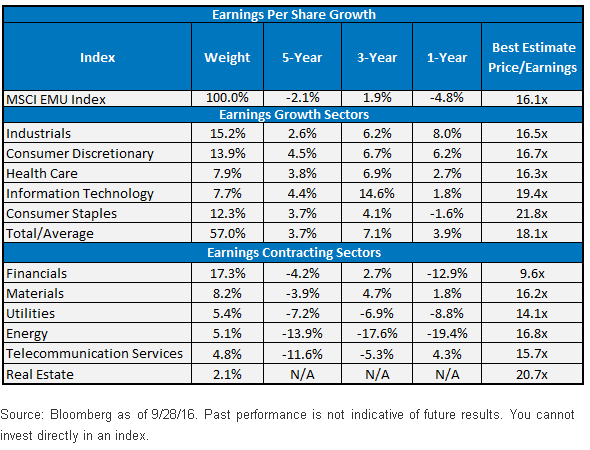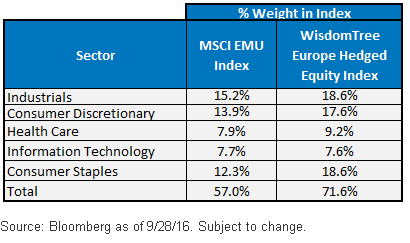Where Is Earnings Growth in Europe?


 Focusing on Earnings Growth in Europe
Recently, we highlighted how European exporters were seeing stronger sales growth and earnings growth than the S&P 500. The WisdomTree Europe Hedged Equity Index (“European Exporters”), which is composed of multinationals of Europe, is achieving this earnings growth largely because it is under-weighting these sectors, which are more challenged from an earnings environment, and tilting weight to where earnings have been growing in Europe. Compared to the 57% of the MSCI EMU Index allocated to these sectors with positive earnings growth, the WisdomTree Europe Hedged Equity Index currently has 72% allocated to these sectors. Notably, under-weighting in Energy and Financials has been helping to introduce a quality bias to the portfolio that has benefited the Index.
For those who believe valuations are low in Europe, one segment of the market with a better earnings growth environment is currently represented by the WisdomTree Europe Hedged Equity Index.
Tilting Toward Positive Earnings Growth Sectors
Focusing on Earnings Growth in Europe
Recently, we highlighted how European exporters were seeing stronger sales growth and earnings growth than the S&P 500. The WisdomTree Europe Hedged Equity Index (“European Exporters”), which is composed of multinationals of Europe, is achieving this earnings growth largely because it is under-weighting these sectors, which are more challenged from an earnings environment, and tilting weight to where earnings have been growing in Europe. Compared to the 57% of the MSCI EMU Index allocated to these sectors with positive earnings growth, the WisdomTree Europe Hedged Equity Index currently has 72% allocated to these sectors. Notably, under-weighting in Energy and Financials has been helping to introduce a quality bias to the portfolio that has benefited the Index.
For those who believe valuations are low in Europe, one segment of the market with a better earnings growth environment is currently represented by the WisdomTree Europe Hedged Equity Index.
Tilting Toward Positive Earnings Growth Sectors
 Unless otherwise stated, data source is Bloomberg as of 9/28/2016.
Unless otherwise stated, data source is Bloomberg as of 9/28/2016.
Important Risks Related to this Article
Investments focused in Europe increase the impact of events and developments associated with the region, which can adversely affect performance.

Jeremy Schwartz has served as our Global Chief Investment Officer since November 2021 and leads WisdomTree’s investment strategy team in the construction of WisdomTree’s equity Indexes, quantitative active strategies and multi-asset Model Portfolios. Jeremy joined WisdomTree in May 2005 as a Senior Analyst, adding Deputy Director of Research to his responsibilities in February 2007. He served as Director of Research from October 2008 to October 2018 and as Global Head of Research from November 2018 to November 2021. Before joining WisdomTree, he was a head research assistant for Professor Jeremy Siegel and, in 2022, became his co-author on the sixth edition of the book Stocks for the Long Run. Jeremy is also co-author of the Financial Analysts Journal paper “What Happened to the Original Stocks in the S&P 500?” He received his B.S. in economics from The Wharton School of the University of Pennsylvania and hosts the Wharton Business Radio program Behind the Markets on SiriusXM 132. Jeremy is a member of the CFA Society of Philadelphia.

